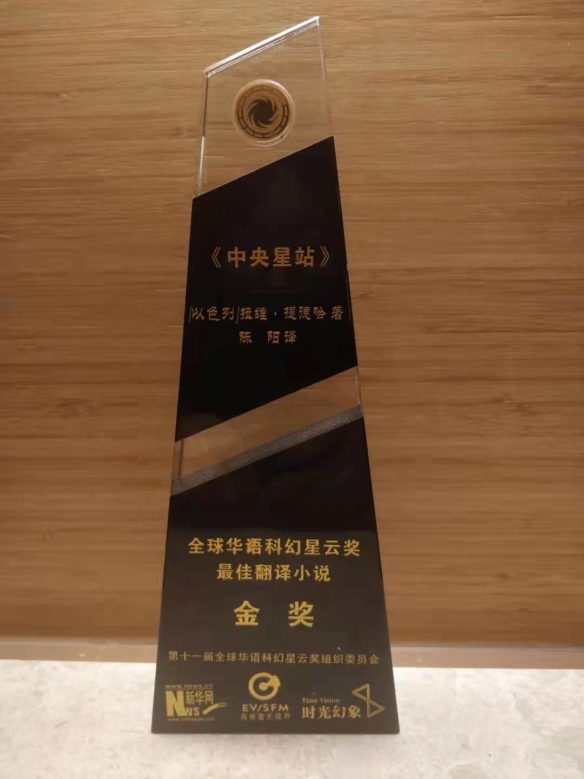
The finalists for the 13th Xingyun (Nebula) Awards for Chinese Science Fiction have been announced by the World Chinese Science Fiction Society. The winners of this juried award will be revealed at the Xingyun Weekend to be held in November 2022.
BEST NOVEL
- The Times of Great Antiquity, by Su Xuejun (China Broadcast, Film & Television Publishing House)
- Reset, by Qidaojun (Qingdao Publishing House)
- Secrets of the Lost Town, by Qi Yue (People’s Literature Publishing House)
- The New New Newspaper Press: Shadow of the Enchanted Metropolis, by Liang Qingsan (New Star Press)
- Travel with My Dear Android, by A Que (Aviation Industry Press)
BEST NOVELLA
- “The Silence of Ever-Peace”, by Liang Qingsan (The Silence of Ever-Peace)
- “A Letter to the Other World”, by Wang Yuan (Nebula XI: A Letter to the Other World)
- “The Eye of Saishiteng”, by Wanxiang Fengnian (The Eye of Saishiteng: A Collection of the 4th Lenghu Award Winning Stories)
- Alea Iacta Est, by Xiao Xinghan (Baihua Literary & Art Press)
- “The Candle Shadow Killer”, by Zhao Lei (Non-Existing SF WeChat Account, October 2021)
BEST SHORT STORY
- “2039: The Era of Brain-Computer Interface”, (Science Fiction World, November 2021)
- “Sky Towards”, by Wanxiang Fengnian, (Galaxy’s Edge 008: Sky Towards)
- “Hummingbirds were Stopping over Honeysuckle Flowers”, by Yang Wanqing (Science Fiction World, April 2021)
- “The Man Who Fought against Time”, by Pan Haitian (The Eye of Saishiteng: A Collection of the 4th Lenghu Award Winning Stories)
- “Lunar Bank”, by Liang Ling (Lunar Bank)
BEST TRANSLATED WORK
- Zima Blue and Other Stories, by Alastair Reynolds, translated by Chen Qiufan, Liu Huiying (Hunan Literature & Art Publishing House)
- Solaris, by Stanisław Lem, translated by Jing Zhenzhong (Yilin Press)
- Project Hail Mary, by Andy Weir, translated by Geng Hui (Yilin Press)
- Inherit the Stars, by James P. Hogan, translated by Qiu Chunhui (New Star Press)
- Star Maker, by William Olaf Stapledon, translated by Baoshu (Sichuan Science and Technology Press)
BEST NON-FICTION
- Modernity and the Unknown:Research on Late Qing Science Fiction, by Jia Liyuan (Peking University Press)
- A Study of Beijing SF Gaming Industry, by Liu Yukun & Yao Lifen (Beijing SF Industry Development Research)
- “Chronicles of Collegiate SF Societies: In Search of Lost Memories of the Early SF Communities”, by He Liu (GCores.com, October 13, 2021)
- “Workshop Report on ‘Sci-Fi China: Avatars, Aliens & Anthropos’”, by Regina Kanyu Wang (42 History WeChat Account, April 29, 2021)
- “Science Fiction as Method: Parallel Universes Crossed”, by Song Mingwei (Foreign Literature & Arts, June 2021)
BEST REVIEW
- “What do We Expect When We Read Fantastic Literature? Notes on Reading Sunlight Trilogy”, by Regina Kanyu Wang (New Star Press WeChat Account, September 9, 2021)
- “Retro-futurism and Steampunk: The Postmodernist Parody in The Difference Engine”, by Lyu Guangzhao (Inquiry and Criticism, No. 4).
- “The Love for Science Fiction, the Profoundness of Meditation: A Review of Meditations on Chinese Science Fiction Literature: Wu Yan’s Self-selected Academic Works”, by Guo Wei (Popular Science Times, January 15, 2021)
- “The Person who Forgot Worries”, by Li Guangyi (Dushu, February 2021)
- “Conversations on Chinese Feminist Science Fiction Literature”, by Yao Haijun, Zhao Haihong & Cheng Jingbo (She – A Collection of the Classic Works of Chinese Female Science Fiction Writers)
BEST NEW WRITER (2019-2021)
- Fenxing Chengzi
- Liu Qi
- Lu Ban
- Tian Rui Shuo Fu
- Wei Mo
[Thanks to Feng Zhang and the World Chinese Science Fiction Association for the story.]
Discover more from File 770
Subscribe to get the latest posts to your email.

It is always interesting to see what gets translated in which country: I would have thought that Solaris must have been much earlier in the ~60 years since its original publication, but as far as I can trust the Chinese Wikipedia, it was not. (Was it considered too risqué?)